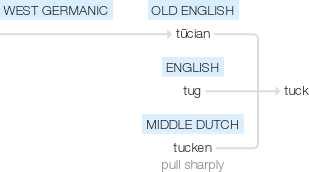Tuck
Old English tūcian ‘to punish, ill-treat’: of West Germanic origin; related to tug. Influenced in Middle English by Middle Dutch tucken ‘pull sharply’.
wiktionary
From Middle English tuken, touken(“to torment, to stretch (cloth)”), from Old English tūcian(“to torment, vex”) and Middle Dutch tucken(“to tuck”), both from Proto-Germanic *teuh-, *teug-(“to draw, pull”) (compare also *tukkōną), from Proto-Indo-European *dewk-(“to pull”). Akin to Old High German zucchen(“to snatch, tug”), zuchôn(“to jerk”), Old English tēon(“to draw, pull, train”). Doublet of touch.
From Old French estoc(“rapier”), from Italian stocco(“a truncheon, a short sword”)
Compare tocsin.
Old Occitan tuc(“uncooked”).
etymonline
tuck (v.)
late 14c., "to pull or gather up," earlier "to pluck, stretch" (implied in tucker "one who finishes clothes by stretching them on tenters, late 13c. as a surname), probably from Middle Low German or Middle Dutch tucken "pull up, draw up, tug" (cognate with Old English tucian "mistreat, torment," and related to Old English togian "to pull," German zucken; see tow (v.)). Sense of "thrust into a snug place" is first recorded 1580s. Slang meaning "to consume, swallow, put into one's stomach" is recorded from 1784. Related: Tucked; tucking.
tuck (n.)
late 14c., "flattened fold in clothing, pleat," from tuck (v.). As a folded-up diving position, from 1951.
